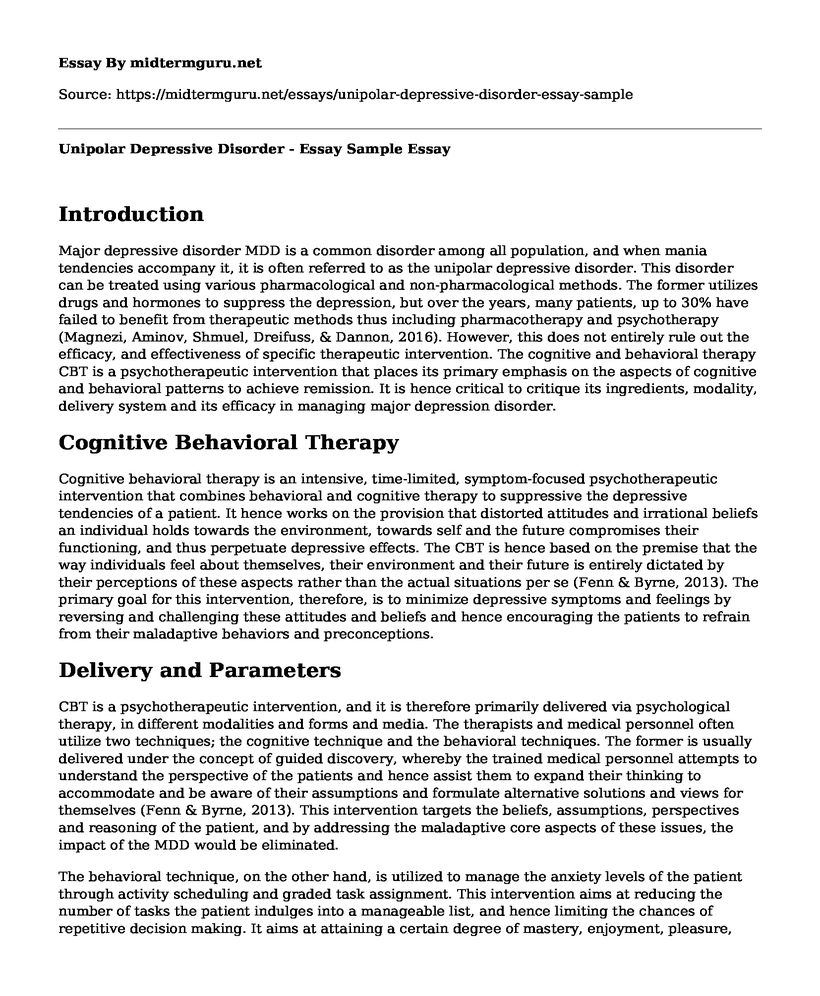Introduction
Major depressive disorder MDD is a common disorder among all population, and when mania tendencies accompany it, it is often referred to as the unipolar depressive disorder. This disorder can be treated using various pharmacological and non-pharmacological methods. The former utilizes drugs and hormones to suppress the depression, but over the years, many patients, up to 30% have failed to benefit from therapeutic methods thus including pharmacotherapy and psychotherapy (Magnezi, Aminov, Shmuel, Dreifuss, & Dannon, 2016). However, this does not entirely rule out the efficacy, and effectiveness of specific therapeutic intervention. The cognitive and behavioral therapy CBT is a psychotherapeutic intervention that places its primary emphasis on the aspects of cognitive and behavioral patterns to achieve remission. It is hence critical to critique its ingredients, modality, delivery system and its efficacy in managing major depression disorder.
Cognitive Behavioral Therapy
Cognitive behavioral therapy is an intensive, time-limited, symptom-focused psychotherapeutic intervention that combines behavioral and cognitive therapy to suppressive the depressive tendencies of a patient. It hence works on the provision that distorted attitudes and irrational beliefs an individual holds towards the environment, towards self and the future compromises their functioning, and thus perpetuate depressive effects. The CBT is hence based on the premise that the way individuals feel about themselves, their environment and their future is entirely dictated by their perceptions of these aspects rather than the actual situations per se (Fenn & Byrne, 2013). The primary goal for this intervention, therefore, is to minimize depressive symptoms and feelings by reversing and challenging these attitudes and beliefs and hence encouraging the patients to refrain from their maladaptive behaviors and preconceptions.
Delivery and Parameters
CBT is a psychotherapeutic intervention, and it is therefore primarily delivered via psychological therapy, in different modalities and forms and media. The therapists and medical personnel often utilize two techniques; the cognitive technique and the behavioral techniques. The former is usually delivered under the concept of guided discovery, whereby the trained medical personnel attempts to understand the perspective of the patients and hence assist them to expand their thinking to accommodate and be aware of their assumptions and formulate alternative solutions and views for themselves (Fenn & Byrne, 2013). This intervention targets the beliefs, assumptions, perspectives and reasoning of the patient, and by addressing the maladaptive core aspects of these issues, the impact of the MDD would be eliminated.
The behavioral technique, on the other hand, is utilized to manage the anxiety levels of the patient through activity scheduling and graded task assignment. This intervention aims at reducing the number of tasks the patient indulges into a manageable list, and hence limiting the chances of repetitive decision making. It aims at attaining a certain degree of mastery, enjoyment, pleasure, and thus eradicate the patterns of procrastination and isolation. The cognitive and behavioral techniques can be administered separately or combined, and the conventional number of session for this intervention is 8, although the therapist can recommend up to 16 sessions.
Efficacy of CBT
CBT has over the years been established as the most effective first-line, evidence-based for MDD at the acute and maintenance levels. This can be backed up by more than 40 original meta-analyses and reports published on the utilization of CBT for MDD and PDD since 2009, with evidence of efficacy in treating the disorder even in non-respondent patients to antidepressants as well as severely affected individuals (Parikh, Quilty, Ravitz, Rosenbluth, Pavlova, Grigoriadis, ... & Uher, 2016). CBT has also been presented as effective as an antidepressant. Therefore, when both the CBT and the pharmacological interventions available are of high quality, the combined administration of both guarantees high recovery rates.
Conclusion
The major depressive disorder is a common destructive condition that often deprives the victims of the ability to be socially and emotionally at peace .many interventions have been put across to mitigate this disorder, and these have included both pharmaco-therapeutic and non-pharmacological interventions. The former utilizes pharmacology and psychotherapy, and in some cases, patients develop resistance to them. However, upon resistance, CBT is utilized to tackle the cognitive and behavioral vectors of the depression and hence guaranteed remission. This method has attained a commendable efficacy in antidepressant capabilities.
References
Fenn K., & Byrne M. (2013). The key principles of cognitive behavioral therapy. InnovAiT, 6(9). Pp. 579-585. https://doi.org/10.1177/1755738012471029
Magnezi R., https://www.ncbi.nlm.nih.gov/pubmed/?term=Aminov%20E%5BAuthor%5D&cauthor=true&cauthor_uid=27536079
Aminov E., Shmuel D., Dreifuss M., & Dannon P. (2016). Comparison between neurostimulation techniques repetitive transcranial magnetic stimulation vs. electroconvulsive therapy for the treatment of resistant depression: patient preference and cost-effectiveness. Patient preference and adherence. 10. Pp. 1481-1487. Doi: 10.2147/PPA.S105654
Parikh S. V., Quilty L. C., Ravitz P., Rosenbluth M., Pavlova B., Grigoriadis S., ... Uher R. (2016). Canadian Network for Mood and Anxiety Treatments (CANMAT)
2016 Clinical Guidelines for the Management of Adults with Major Depressive Disorder: Section 2. Psychological Treatments. The Canadian Journal of Psychiatry, 61(9). Pp. 524-539. https://doi.org/10.1177/0706743716659418
Cite this page
Unipolar Depressive Disorder - Essay Sample. (2023, Jan 04). Retrieved from https://midtermguru.com/essays/unipolar-depressive-disorder-essay-sample
If you are the original author of this essay and no longer wish to have it published on the midtermguru.com website, please click below to request its removal:
- Essay on Love and Addiction
- Archetype of the Mother Figure in Literature - Essay Sample
- Annotated Bibliography: Obsessive-Compulsive Disorder and Obsessive-Compulsive Personality Disorder
- Daniel Gonzalez Case Study
- Advanced Practice Registered Nurses - Essay Sample
- 1976 Ebola Outbreak in Central Africa: Yambuku Mission Hospital as Patient Zero - Essay Sample
- Bob Selling Unapproved Drugs to US Consumers: Potential Harms - Essay Sample







